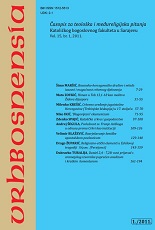Himan u Tob 13,1-18 kao molitva Židova dijaspore
THE HYMN OF TOBIT 13:1-18 AS A PRAYER OF THE JEWISH DIASPORA
Author(s): Mato ZovkićSubject(s): Christian Theology and Religion
Published by: Katolički bogoslovni fakultet
Keywords: Tobit; exile; Diaspora; Jews; marriage; prayer; believers as sojourners; liturgy of the Church
Summary/Abstract: This is an exegetical contribution to the exploration of Tobit 13:1-18 from the perspective of its meaning in the context of the whole book. As one of the Jewish exiles Tobit works for the Assyrian king and at the end of the book, after he and his wife Anna depart, he asks his son and daughter-in-law to leave Niniveh and move to another place where they can live more safely, preserving their Jewish identity and educating their children in their shared faith but he does not ask them to move to the land of Israel. Together with other Christian and Jewish scholars this author concludes that Tobit was written for the Jewish Diaspora around the year 200 BC to help them preserve their faith in the God of the covenant and their ethnic identity. Five prayers of Tobit illustrate events in their immediate context: the prayer for death of Tobit (3:2-6) and Sarah (3:11-15), the prayer of Tobit and Sarah on their wedding night (8:5-8), Raguel’s prayer of thanksgiving after his son-in-law survives the wedding night (8:15- 17), and Tobit’s prayer of praise after his sight is miraculously restored (11:14-15). In his Psalm-like prayer Tobit first praises God who educates his people in the Diaspora through discipline but who also grants mercy (13:1-8), then he summons his fellow Jews and gentiles to praise God, who is about to rebuild Jerusalem and bring the scattered people of Israel back to it (13:9-18). By examining the hymn exegetically, the author shows how the Canticle of Tobit is connected to the whole narrative of the book and to the Deuteronomy, Prophetic and Wisdom traditions of the Old Testament. As well as its social meaning, Diaspora in Old Testament books can also have spiritual meaning. A sincere believer is a “sojourner” in his or her own country (Lev 19:33-34; 1 Chr 29:15; Ps 39:13 etc). Social and spiritual Diaspora represent a “school of hope” (L. Alonso Schökel). Some New Testament writings adopt Old Testament designation “the twelve tribes of the Dispersion, aliens and exiles” (James 1:1; 1 Pt 1:17; 2:11) for Christian believers, in the sense of social and spiritual Diaspora. Different passages of Tobit, especially 13:1-8 are used in the Liturgy of the Hours and in the Liturgy of the Word. While we Christians pray Tobit’s Hymn we should not forget its original meaning for the Jews - in history and today.
Journal: Vrhbosnensia
- Issue Year: 2011
- Issue No: 1
- Page Range: 31-56
- Page Count: 26
- Language: Croatian

